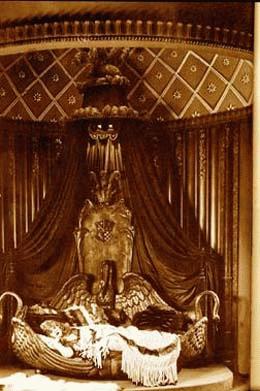On October 26, 1924, a film crew headed by famed Hollywood director Cecil B. DeMille (1881-1959) is forced off Mount Rainier's Nisqually Glacier when blizzard conditions overtake the company. DeMille is shooting on location for the film
The Golden Bed
(Paramount, 1925), with Mount Rainier standing in for the Swiss Alps.
The Golden Bed
Based on a serial called
Tomorrow's Bread, The Golden Bed
centered on Flora (Lillian Rich), a scheming American woman who marries into European royalty to bolster her own sagging fortunes (symbolized by the golden bed of the title). After her husband, the Marquis de San Pilar (Theodore Kosloff) and a rival plunge to their deaths on an Alpine glacier, Flora turns her romantic attention toward Admah Holtz (Rod La Rocque). Although tempted by Flora's charms, Holtz escapes her romantic designs and instead marries Margaret (Vera Reynolds), Flora's sister, who has long loved Holtz from afar. Broken, in ill health, and with her fortune slipping away, the conniving Flora eventually returns to her crumbling estate to die.
A modest picture in the DeMille canon, The Golden Bed was the director's final film for Paramount before setting up his own studio in the mid-1920s. Produced for just under $440,000, the picture grossed $816,000.
Trouble at Paradise
DeMille and a crew of 40 arrived in Tacoma in mid-October 1924, in preparation for shooting the Alpine scenes in The Golden Bed. On Sunday, October 26, after nearly a week in Mount Rainier National Park, the company was positioned on the Nisqually Glacier to film the fight between Kosloff and actor Robert Cain, cast as the Marquis' rival, Savarac. Around 3 p.m. that afternoon, the weather on Mount Rainier looked as if it might turn, and DeMille was advised three times by hired guides that they should retreat to the safety of Paradise Inn. DeMille brushed off the warnings. He was behind schedule and needed to squeeze in a few extra shots.
Rather than make up precious shooting time, that decision instead afforded a demonstration of Mother Nature's fickleness. As the guides had warned, conditions on the glacier went from pristine to dangerous in a matter of minutes. With the principal actors still clad in Swiss costumes, an immediate evacuation was necessary. The guides quickly split the crew into three groups and lead them on a slow trek back to Paradise Inn; Lillian Rich and two other women had to be carried out on the backs of others whose hands were made numb by the icy winds, according to one account. Conditions on Mount Rainier changed so quickly that DeMille had to abandon $20,000 in lighting and film equipment on the glacier, there being no time to pack it out with the rest of the crew. (With the assistance of guides and forest rangers, several of DeMille's crew eventually retrieved the lost equipment.)
An Epic Adventure
The local press was quick to put a dramatic spin on the "danger" faced by the cast and crew of The Golden Bed, as evidenced by the story's front-page coverage in the Tacoma News Tribune.
"The entire company that came down with [DeMille] was in ecstasies over the trip, but all, too, had something of the awe that formerly possessed the Indians whose traditions taught them that the God of the Mountain would certain visit vengeance on any who attempted to invade its sacred heights" ("Movie Stars Fight Mountain Blizzard").
Ancient traditions aside, the presence of DeMille and his crew lent a bit of Hollywood glamour to Mount Rainier, even if the experience of shooting in the great outdoors wasn't always a pleasurable experience for those involved. Cameraman Eddie Coffee took an unexpected tumble over a 10-foot ledge, for instance, his equipment bashing him in the neck and head.
Then there was the wildlife. Robert Cain claimed to have become lost on an early evening stroll, only to come face-to-face with a large bear. Animals made away with some of the company's food provisions, which apparently were not properly secured and protected. Not even Paradise Inn offered refuge -- rodents were a constant scourge -- with a certain pilfering pack rat eventually making off with some of DeMille's socks ("Movie Stars Fight Mountain Blizzard").
Still, the participants had nothing but praise for the shooting location. "I have climbed the Alps and the Matterhorn," Cain remarked in a blatant effort to flatter the locals, "but for thrills and real sport I would say that Mount Tacoma holds the greater interest." (In the spirit of a long-continuing controversy, the News Tribune always referred to the peak as Mount Tacoma, close to the traditional Indian name, while other news sources referred to it as Mount Rainier, the name given it by Captain George Vancouver when he explored the area in 1792. The naming issue would not be settled until the 1930s.)
Cecil DeMille, holding court with reporters in the lobby of the Tacoma Hotel, was equally unaffected by the experience. "It has been a wonderful trip, and it is the grandest mountain in the world" ("Movie Stars Fight Mountain Blizzard").
Even so, DeMille sounded a word of caution for a pair of Hollywood location scouts whom the company encountered as they made their way back to Tacoma following the blizzard. "I don't envy their job when the mountain is acting up," the director remarked.
The Great Escape
With more than 13,000 feet of exposed film in their possession (footage that was, to the company, more precious than the equipment they left behind on the glacier), the blizzard incident marked an end to DeMille's shooting schedule on Mount Rainier. After appearing before local reporters the day following the incident, the cast and crew of The Golden Bed beat a hasty retreat from Tacoma at 1:05 a.m. on October 28, 1924, traveling back to Hollywood in a special train car.

